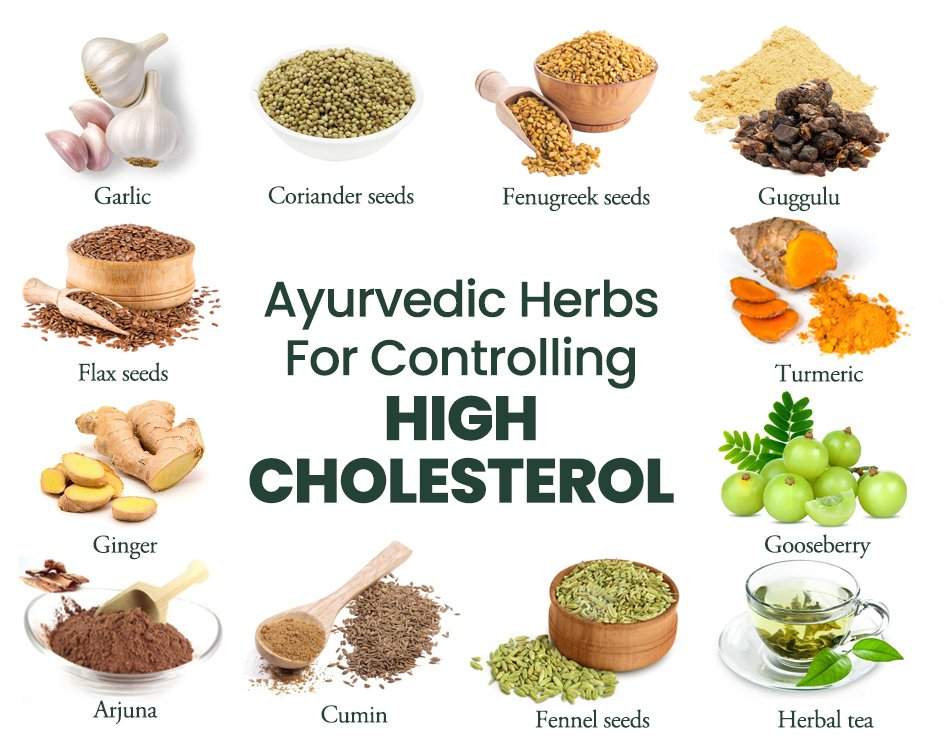Powerful Plant Allies: The Top Herbal Solutions for Lowering Cholesterol Safely and Effectively Without Chemical Drugs
 |
| Going Herbal: A Natural Solution to Lower Cholesterol Levels // Dr Sharda Ayurveda |
Unlocking the Healing Potential of Nature: Discover the Science-Backed Benefits of Garlic, Turmeric, Green Tea, and More for Managing Cholesterol Naturally
R E A D : Main Causes of High Cholesterol and Harmful Effects on the Body
Maintaining healthy cholesterol levels is crucial for overall health, as high levels of LDL or "bad" cholesterol can lead to various cardiovascular diseases. While prescription medications are often recommended to lower cholesterol levels, some people may prefer natural alternatives. Fortunately, there are several herbal plants that have been shown to be effective in lowering cholesterol levels without the potential side effects associated with chemical drugs. In this article, we will explore a list of herbal plants that can help you manage your cholesterol levels safely and naturally.
This list of herbal plants to lower cholesterol levels, safer than chemical drugs
> Garlic: Garlic is a commonly used herb that has been shown to lower cholesterol levels by reducing LDL cholesterol and increasing HDL cholesterol. It also has anti-inflammatory properties that may help reduce the risk of heart disease.
> Turmeric: Turmeric contains curcumin, a compound that has been shown to have cholesterol-lowering effects. It also has anti-inflammatory properties that may help reduce the risk of heart disease.
> Green Tea: Green tea is rich in antioxidants called catechins, which have been shown to lower LDL cholesterol levels. It also has anti-inflammatory properties that may help reduce the risk of heart disease.
> Hibiscus: Hibiscus tea has been shown to lower LDL cholesterol levels in people with high cholesterol. It also has antioxidant properties that may help reduce the risk of heart disease.
> Ginger: Ginger has been shown to lower cholesterol levels by reducing LDL cholesterol and triglycerides. It also has anti-inflammatory properties that may help reduce the risk of heart disease.
> Fenugreek: Fenugreek seeds have been shown to lower LDL cholesterol levels by blocking cholesterol absorption in the intestines. It also has anti-inflammatory properties that may help reduce the risk of heart disease.
> Cinnamon: Cinnamon has been shown to lower LDL cholesterol levels and increase HDL cholesterol levels. It also has anti-inflammatory properties that may help reduce the risk of heart disease.
R E A D : 11 effective ways to lower cholesterol levels that you usually condition
> Artichoke: Artichoke has been shown to lower cholesterol levels by reducing the production of cholesterol in the liver. It also has antioxidant properties that may help reduce the risk of heart disease.
> Psyllium: Psyllium is a type of fiber that has been shown to lower LDL cholesterol levels by reducing cholesterol absorption in the intestines. It is commonly found in over-the-counter fiber supplements.
> Red Yeast Rice: Red yeast rice is a fermented rice product that contains naturally occurring statins, which are compounds that can lower cholesterol levels. It is often used as a natural alternative to prescription statin medications.
 |
| A Natural Solution to Lower Cholesterol Levels // hotcore.info |
> Niacin: Niacin, also known as vitamin B3, has been shown to lower LDL cholesterol levels and increase HDL cholesterol levels. It is available in supplement form but should only be taken under the supervision of a healthcare provider.
> Holy Basil: Holy basil, also known as tulsi, has been shown to lower LDL cholesterol levels and increase HDL cholesterol levels. It also has antioxidant and anti-inflammatory properties that may help reduce the risk of heart disease.
It is important to remember that while herbal plants can be a natural and safe way to lower cholesterol levels, they may not be effective for everyone. It is always recommended to speak with a healthcare provider before starting any new supplement or herbal treatment to ensure it is safe and appropriate for your individual needs.
herbal plants can be a natural and safe way to help manage cholesterol levels, but they should never replace prescription medications without first consulting with a healthcare provider. Incorporating these herbs into a healthy diet and lifestyle may offer additional benefits beyond cholesterol management, such as reducing inflammation and promoting overall heart health. However, it's important to use caution when taking herbal supplements and to always follow recommended dosages to avoid potential side effects. By working with a healthcare provider and taking a holistic approach to cholesterol management, individuals can make informed decisions about their health and well-being.
R E A D :
- Chia Seeds The Nutrient-Dense Superfood for Improved Health and Wellness
- Exploring the Health Benefits of Pomegranate A Superfood for Optimal Wellness
- The Importance of Nail Health and How to Maintain Strong and Beautiful Nail
- The Power of Yoga for Weight Loss: How to Use Your Practice to Reach Your Goals
- The Ultimate Guide to a Comprehensive Weight Loss Program: Strategies for Sustainable and Successful Results

No comments:
Post a Comment